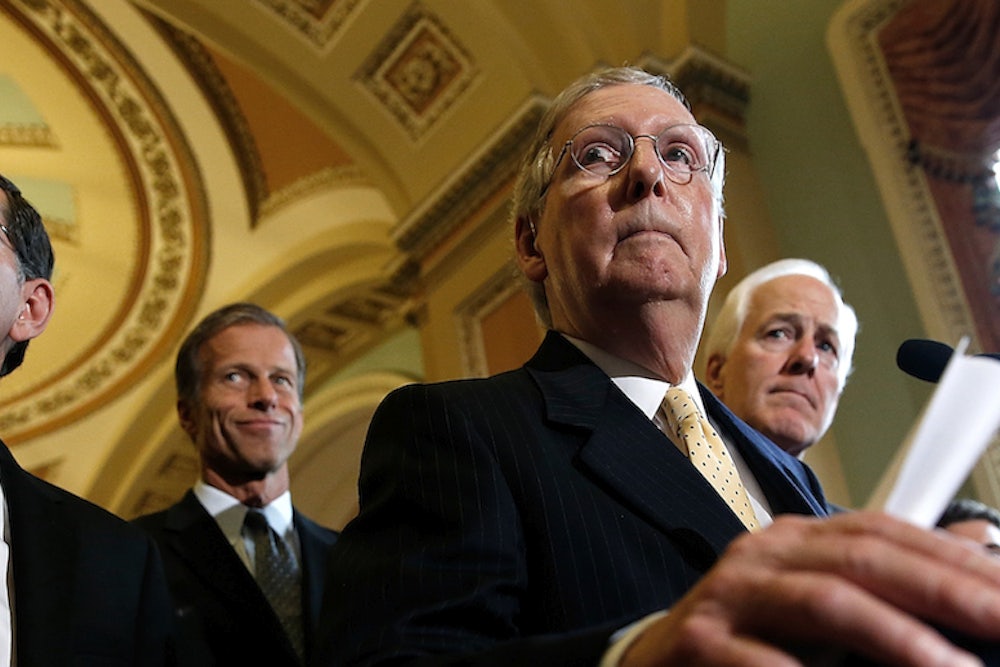If Republicans win control of the Senate in November, as polls continue to suggest they will, the most direct change to the existing power structure in Washington won’t be to lawmaking, which will remain subject to veto, but to the executive and judicial branches, which will lose a Democratic majority that’s friendly to President Obama’s nominees.
That’s a recipe not just for gridlock, but for management problems within the government and for unnecessary vacancies on the federal bench. This story has been told before. What hasn’t been discussed much, though, is the possibility that Republicans will reverse a change Democrats made to the filibuster rules, which allows simple majorities to confirm all executive and judicial branch nominees, save for Supreme Court picks.
This is a genuine point of contention within the Senate GOP conference. And it’s possible that Republicans wouldn’t be able to muster the 51 votes they’d need to reverse the rule change. But either way, it’s clear that they want the press to frame this as a story about Republicans agreeing to relinquish power for the benefit of old norms and fresh comity. But the truth is basically the reverse. In a counterintuitive way, restoring the filibuster for nominations next year would constitute a power grab by the Republican majority. And this time, it would make the Senate more undemocratic than it already is.
To understand why, consider the possibility of an unexpected Supreme Court vacancy. When Democrats changed the rules, they conspicuously left Supreme Court nominees subject to the filibuster. Presumably if a vacancy had arisen in the past few months, and Republicans filibustered a qualified liberal nominee, Senate Majority Leader Harry Reid would’ve just changed the rules again. Instead, Republicans will likely come into power with the Supreme Court filibuster intact. And, with two years left in Obama’s presidency, it would be a remarkable concession to him if they eliminated it next year. Why make it easier, even at the margins, for Obama to confirm a new Supreme Court justice without substantial Republican buy-in?
Restoring the filibuster would re-erect that same hurdle for all other nominees. Hundreds of them. Which is why it’s impossible to imagine that Mitch McConnell would even consider reimposing the filibuster on all nominees if the president happened to be a Republican. But under the circumstances, it would strengthen his hand in negotiations with the White House to make nominees harder to confirm.
Of course, if Republicans win the Senate they’ll gain substantial power in this realm no matter what they do about the filibuster. The White House would still need some Republican support to confirm any nominee, and, moreover, Republicans could stall or kill nominations much earlier in the process than the Senate floor vote.
But requiring Obama to find 60 votes for his nominees wouldn't be a gesture of camaraderie, when they could leave the threshold at 50 by doing nothing. It would be a harbinger of greater acrimony and polarization.
What makes this fairly straightforward logic slightly confusing is that Dems invoked the “nuclear option” very recently, in what was widely understood to be a power grab (even if it was a necessary, predictable, and righteous power grab). Reversing it can therefore be painted inaccurately as a symmetrical power sacrifice. But that creates the kind of conceptual confusion on display in this Politico article, which posits that Republicans may adopt the Democrats’ “bellicose” majority rule tactic, and that doing so would be tantamount to “revenge.”
In fact, the exact opposite is true. When Senator John McCain says “I will work very hard to go back to 60 votes” he isn’t calling for a truce. He’s calling for a two-year hiatus in judicial confirmations and long, unnecessary cabinet and sub-cabinet vacancies, at a time when Obama’s only real power exists within the executive branch. If Democrats control 48 Senate seats next year, then under the current rules, they'd only need two Republican commitments to demonstrate that a particular nominee could be confirmed. Increase the threshold for confirmation to 60 votes, and suddenly Democrats would need to find 12. That'll prove to be an impossible lift in many cases.
Ironically, McCain and others are also expressing little confidence in the likelihood that Republicans will control both Congress and the White House in 2017. If that were to happen, Republicans would probably reconsider the wisdom of the filibuster all over again, and regret having gone on record to strengthen it in 2015. If you think that Democrats are going to sweep back into power two years down the road, or at the very least retain control of the White House, then re-erecting the filibuster makes even more sense than doing it just to constrain Obama. But in the short term, restoring the vanquished rule would be all about making Obama the lamest of ducks.
